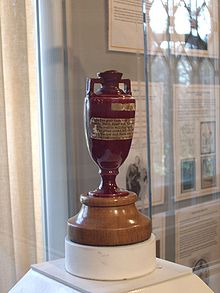This article's tone or style may not reflect the encyclopedic tone used on Wikipedia. (August 2024) |
| 2005 Ashes series | |||||||||||||||||||||||||
|---|---|---|---|---|---|---|---|---|---|---|---|---|---|---|---|---|---|---|---|---|---|---|---|---|---|
| Part of the Australian cricket team in England in 2005 | |||||||||||||||||||||||||
 Ashes 2005 series logo | |||||||||||||||||||||||||
| Date | 21 July 2005 – 12 September 2005 | ||||||||||||||||||||||||
| Location | England | ||||||||||||||||||||||||
| Result | England won the five-Test series 2–1 | ||||||||||||||||||||||||
| Player of the series | Andrew Flintoff (Eng) and Shane Warne (Aus) Compton–Miller Medal: Andrew Flintoff (Eng) | ||||||||||||||||||||||||
| |||||||||||||||||||||||||
The 2005 Ashes series was that year's edition of the long-standing cricket rivalry between England and Australia. Starting on 21 July 2005, England and Australia played five Tests, with the Ashes held by Australia as the most recent victors. The final result was a 2–1 series win for England, who succeeded (for the first time since 1986–87) in their biennial attempt to win the urn.
In March 2005, Australia captain Ricky Ponting said this Ashes series would be the closest since Australia's dominance began in 1989.[1] Since 1989, when Australia started their winning Ashes streak,[2] England had lost by more than one match in all but one of the series played, that of 1997. During that period, Australia were the pre-eminent side in the world, while England had dropped from being the top-rated in 1981 to sixth for much of the 1990s, reaching a low point in 1999 with a series loss to New Zealand leaving them bottom of the unofficial Wisden Cricketers' Almanack rankings.[3] However, since the previous series in 2002–03, England had improved on their fifth place in the official rankings,[4] and were second before this series. Australia were still top-ranked, but England had won 14 and drawn three of their 18 previous Test matches since March 2004, and had won six successive series. Nonetheless, before the First Test some Australians, including fast bowler Glenn McGrath,[2] were suggesting that a 5–0 win in the series for Australia was a serious possibility.
On the day after the series it was "hailed as the most thrilling series ever".[5] Three matches in particular were very closely fought, with one match decided by a two-run margin, one match drawn with only one wicket remaining, and one match won by three wickets. The outcome of the contest was not decided until the last day of the series.
Australia won the first Test comfortably, but in the second Test at Edgbaston, considered to be one of the greatest of all time,[6] England levelled the series with a two-run victory, the narrowest win in Ashes history.[7] The third Test ended in a draw (with England one wicket away from a win), and England won the fourth Test in Nottingham (Trent Bridge) by three wickets, losing seven men in a chase of 129, after England enforced the follow-on after gaining a lead of 259 on first innings.
The fifth and final Test started on 8 September, at the Oval in London. It entered its final day with England batting in their second innings, 40 runs ahead with nine wickets in hand. Australia needed a win to force a 2–2 series draw and retain the Ashes; any other result would give the Ashes to England and end 16 years and eight series of Australian dominance. After a day of fluctuating fortunes, England established a lead of 341 after Kevin Pietersen's maiden century of 158 runs, and Australia batted for one over before the teams went off for bad light, and the match was declared a draw, ensuring the return of the Ashes to England.

- ^ "Ponting wary of improved England". BBC Sport. British Broadcasting Corporation. 30 March 2005. Retrieved 31 December 2005.
- ^ a b "Ashes warning from McGrath". BBC Sport. British Broadcasting Corporation. 8 September 2004. Retrieved 31 December 2005.
- ^ Engel, Matthew (2000). Wisden Cricketers' Almanack 2000. Wisden. ISBN 0-947766-58-8.
- ^ "ICC Test Championship Tables". International Cricket Council. Archived from the original on 11 December 2005. Retrieved 31 December 2005.
- ^ "Ashes media watch". BBC Sport. British Broadcasting Corporation. 13 September 2005. Archived from the original on 1 January 2006. Retrieved 31 December 2005.
- ^ "England's greatest Test – the results". BBC Sport. Retrieved 16 January 2021.
- ^ "England clinch thrilling victory". BBC Sport. British Broadcasting Corporation. 7 August 2005. Retrieved 31 December 2005.